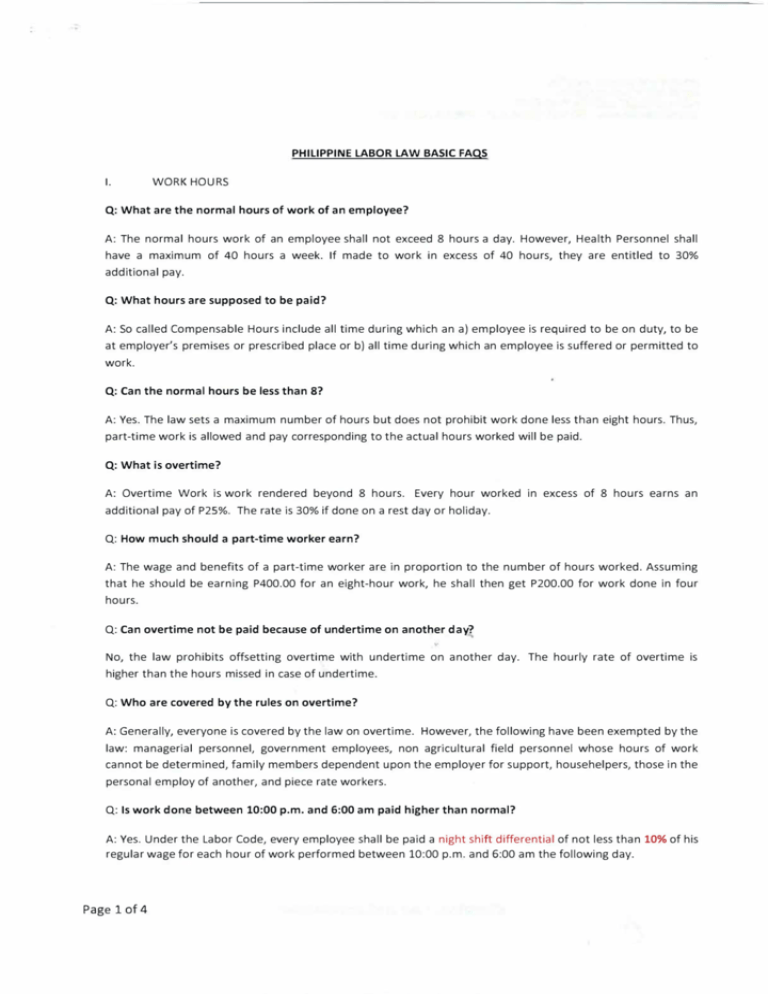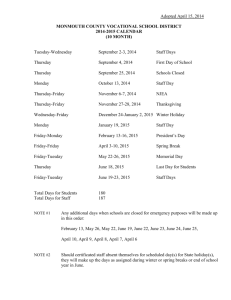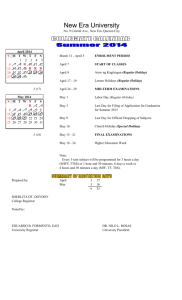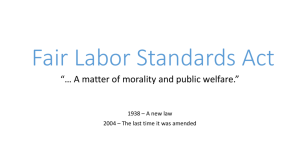philippine labor law basic faqs
advertisement

PHILIPPINE LABOR LAW BASIC FAQS I. WORK HOURS Q: What are the normal hours of work of an employee? A: The normal hours work of an employee shall not exceed 8 hours a day. However, Health Personnel shall have a maximum of 40 hours a week. If made to work in excess of 40 hours, they are entitled to 30% additional pay. Q: What hours are supposed to be paid? A: So called Compensable Hours include all time during which an a) employee is required to be on duty, to be at employer's premises or prescribed place or b) all time during which an employee is suffered or permitted to work. Q: Can the normal hours be less than 8? A: Yes. The law sets a maximum number of hours but does not prohibit work done less than eight hours. Thus, part-time work is allowed and pay corresponding to the actual hours worked will be paid. Q: What is overtime? A: Overtime Work is work rendered beyond 8 hours. Every hour worked in excess of 8 hours earns an additional pay of P25%. The rate is 30% if done on a rest day or holiday. Q: How much should a part-time worker earn? A: The wage and benefits of a part-time worker are in proportion to the number of hours worked. Assuming that he should be earning P400.00 for an eight-hour work, he shall then get P200.00 for work done in four hours. Q: Can overtime not be paid because of undertime on another day_? No, the law prohibits offsetting overtime with undertime on another day. The hourly rate of overtime is higher than the hours missed in case of undertime. Q: Who are covered by the rules on overtime? A: Generally, everyone is covered by the law on overtime. However, the following have been exempted by the law: managerial personnel, government employees, non agricultural field personnel whose hours of work cannot be determined, family members dependent upon the employer for support, househelpers, those in the personal employ of another, and piece rate workers. Q: Is work done between 10:00 p.m. and 6:00 am paid higher than normal? A: Yes. Under the Labor Code, every employee shall be paid a night shift differential of not less than 10% of his regular wage for each hour of work performed between 10:00 p.m. and 6:00 am the following day. Page 1 of 4 II. REST DAYS Q: What is a weekly rest day? A: It is the required rest period of not less than 24 consecutive hours after every six normal workdays. Q: How much is the pay for work on a rest day? A: The compensation is the regular wage plus 30% thereof. Q: Who chooses the rest day? A: The employer shall determine the weekly restday. However, the employer shall respect the preference of employees as to their weekly restday when such preference is based on religious grounds. Q: How much is work on a Sunday paid? A: The compensation is the regular wage unless Sunday happens to be the rest day of the employee. If Sunday is the rest day, the employee shall be entitled to the additional 30% pay. Ill. HOLIDAY PAY Q: What is Holiday Pay? Holiday Pay refers to pay received by an employee on the occasion of a regular holiday or special day. In the case of regular holiday, the employee is paid even if he/she did not work. He/She receives double pay if he/she works on a regular holiday. In the case of a special day (see below), the employee is not paid if he/she does no report for work. But if the employee works on a special day, she is entitled to 130% of her usual pay. Q: What are the 2015 holidays in the Philippines? A. Regular Holidays New Year's Day 1 January (Thursday) Maundy Thursday 2 April Good Friday 3 April Araw ng Kagitingan Labor Day 9 1 April (Thursday) May (Friday) Independence Day 12 National Heroes Day 31 June (Friday) August (Last Monday of August) Bonifacio Day 30 November (Monday) Christmas Day 25 30 December (Friday) Chinese New Year 19 February (Thursday) Black Saturday 4 April Ninoy Aquino Day 21 August (Friday) All Saints Day Additional special (non-working) days 1 November (Sunday) 2 January (Friday) 24 December (Thursday) Rizal Day December (Wednesday) B. Special (Non-Working) Days Page 2 of 4 Last Day of the Year 31 December (Thursday) C. Special Holiday (for all schools) EDSA Revolution Anniversary 25 February (Wednesday) *source: Presidential Proclamation 831 series of 2014 IV. LEAVES Q: What are leaves? A: These are days when employees may still be paid despite their absence from work. The leaves allowed by law are discussed below, but the employer may add (not subtract) to these leaves out of the goodness of her heart or under a negotiated Collective Bargaining Agreement (CBA). Q: What are leaves under the law? A: Kinds of Leaves under the Philippine Labor Law Service Incentive Leave Service Incentive Leave Pay is the benefit of employees to avail of leave with pay for 5 days provided she has rendered service for at least one year. Maternity Leave A female member of the Social Security System (SSS) who has paid at least 3 monthly contributions in the twelve-month period immediately preceding the semester of her childbirth or miscarriage shall be paid a daily maternity benefit equivalent to 100% of her average daily salary. The benefit is for 60 days for normal delivery and 78 days for caesarian delivery for the first four deliveries and miscarriages. Leaves under RA 9262 Women victims of violence provided under R.A. 9262 of the Anti-Violence against Women and their Children Act are entitled to a paid leave of absence from work up to 10 days. V. Solo Parents' Leave Persons who fall under the definition of solo parents and who have rendered service of at least one year are entitled to 7 working days of leave to attend to their parental duties. Paternity Leave The law provides for paternity leave of 7 days with full pay to all married male employees in the private and public sectors. It is only available for the first four (4) deliveries of the legitimate spouse with whom the employee is cohabiting. Leaves under RA 9710 The Magna Carta of Women introduced a 2 month leave for women with full pay based on gross monthly compensation, for women employees who undergo surgery caused by gynecological disorders, provided that they have rendered continuous aggregate employment service of at least six (6) months for the last twelve (12) months WAGES Q: Generally, what is the rule on wages? A: Under Philippine law, wages are remunerations or earnings for services rendered. Employers and employees may agree on rate but should not fall below the minimum wages set by the Regional Tripartite Wages and Productivity Boards (RTWPB} which has jurisdiction over the place of work. You can find the rate of minimum wage by going to the website of the National Wages and Productivity Commission (NWPC) http://www.nwpc.dole.gov.ph/rtwpb.html. Page 3 of 4 The pay of employees is intended to be given whole to the employee in Philippine legal tender. So while payment by check and through automated teller machines (ATMs) are allowed, vouchers, promissory notes and gift certificates are not. Deductions from employee wages are generally frowned upon with only a few allowed by law including income tax, contributions to social welfare agencies such as SSS and Pag-lbig, and union dues under appropriate agreements. Minimum Wage Earners Exempt from Income Tax A: A new law passed in 2008 exempts minimum wage earners from paying income taxes. Because of this, no deductions will be made from their pay on the basis of income tax. Q: What is a Bonus? A: Bonus is the amount granted for employee's industry and loyalty, which is generally discretional. However, there have been times when the grant of bonuses have been considered as long standing practice and therefore cannot be simply withheld without cause. Q: What is 13th month pay? A: 13th month pay is the 1/12 of the basic salary earned by the employee during the year. It is compulsory and to be given not later than December 24 of the year. Page 4 of 4







